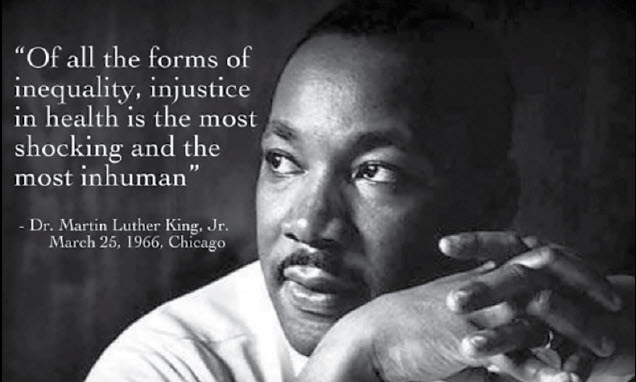 By: Jackie Warner
By: Jackie Warner
As we remember Dr. Martin Luther King Jr, I am reminded of his fight for healthcare equity. I share his quote from 1966: “We are concerned about the constant use of federal funds to support this most notorious expression of segregation. Of all the forms of inequality, injustice in health is the most shocking and the most inhuman because it often results in physical death.”
Now fast forward to present day 2024, almost 60 years later. It was just a few days ago, I received a call that a family member was being transported to a local hospital for treatment, and when I arrived, I was asked to wait until all was prepared for a visitor in the ER. Once allowed back to the area, the nurse on staff was kind and seemed genuinely concerned about the care of my family member. I asked if the nurse would continue to be on shift, and they informed me that he only had about 20 minutes left.
About one hour later, I received a call from the next nurse on duty, stating that my relative was being discharged. I knew this could not be the case because of their condition, so I questioned the discharge decision, attempting to be an advocate to help since the patient was so sick. I was met with much opposition and disregard for the patient’s health, saying that we would need to sign them back in if we wanted any additional care. We then asked about the diagnosis and any testing conducted and was told we would have to request medical records once they were open, which would be in 3 days. I was upset and disappointed at the lack of concern, seeing the patient now discharged was seated in the waiting room throwing up with severe head pain. I asked to speak with the quality assurance representative on call but was told they had no one at that time. Another nurse came out and asked me about my association with the patient, and I explained who I was. Then I was told by the nurse they could not let patients just come here to sleep, and further stated they must have room for those who are really sick. Let’s not forget this patient came via ambulance and was discharged without any prescriptions or real diagnosis for their condition.
After many attempts to obtain adequate treatment, which seemed hopeless, I told my relative I would take them to another health facility…And yes the relative was admitted to the next hospital diagnosed with pneumonia. Did the patient not have pneumonia at the first local health facility? Of course they did, but my relative was discharged and sent out as if they were a homeless beggar on the street with no insurance, just looking for a bed to sleep in. Neither was the case.
The struggle is real and continues. According to a national survey, minorities say they have to speak up to get the proper care while being treated with less respect than other patients. I did not take the survey but sadly have witnessed this too many times in our communities.
CDC says that to build a healthier America for ALL, we must confront the systems and policies that have resulted in the generational injustice that has given rise to racial and ethnic health inequities. I challenge all of us to be a voice on the side of right for equitable health removing bias actions.
1. Having an intentional understanding of the cultures from which your patients come
2. Avoiding stereotyping your patients; individualize them.
3. Implicit biases (unconscious biases) are pervasive; we all have them, but they can be unlearned.
4. As with medication, the words we speak and actions we choose can heal or harm.








